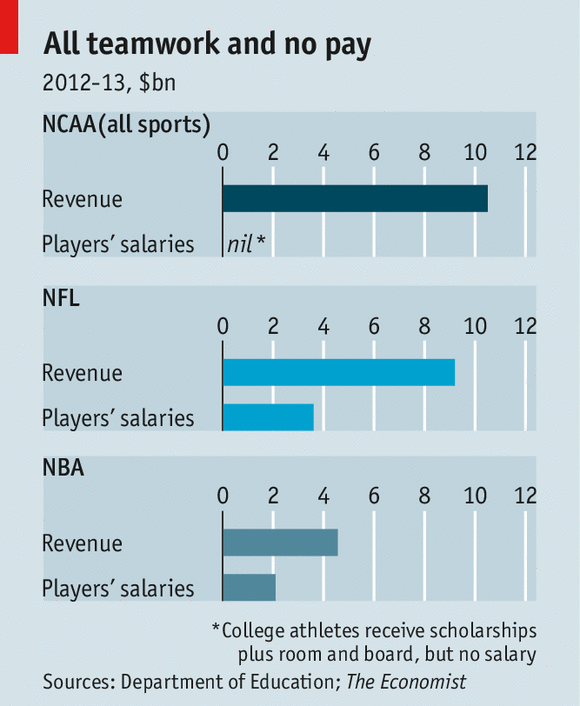College athletes should be paid because they bring in significant revenue, increase admission rates, work full-time, and are unable to hold other jobs due to the demands of their sport. This assistance can also provide financial awareness and teach athletes about personal finances, as many of them struggle after retirement.
However, the topic remains controversial, as opponents argue that paying athletes goes against the amateur nature of college sports and that athletes already receive compensation through scholarships. Despite the debate, it is clear that college athletes play a crucial role for their schools and deserve fair compensation for their dedication and the revenue they generate.
Financial Impact
One of the main reasons why college athletes should be paid is the significant financial impact they have on their colleges. These athletes bring in a substantial amount of money through various means, such as ticket sales, merchandise, and broadcasting deals. Let’s delve deeper into this financial impact by exploring two crucial aspects: revenue generation and boost in admission rates.
Revenue Generation
College athletes have become major revenue generators for their colleges and universities. The popularity and success of college sports, such as football and basketball, have led to lucrative broadcasting contracts and endorsement deals. These revenue sources contribute significantly to the financial stability of educational institutions, funding various academic and athletic programs.
According to PlayToday, college sports generate billions of dollars in revenue annually. In fact, during the last twenty years, college sports has gained immense popularity, resulting in a large amount of revenue for the NCAA and the schools they represent. By investing their time, effort, and talent into their respective sports, college athletes play a crucial role in driving this financial success.
Boost In Admission Rates
College sports not only generate revenue but also play a vital role in attracting prospective students. Successful athletic programs often create a sense of pride and loyalty among fans, alumni, and potential students. This increased interest in the college’s sports teams can lead to a boost in admission rates.
A study by SmartAsset found that paying college athletes could help create a sense of financial awareness while also attracting more students to institutions. When college athletes are compensated for their hard work and dedication, it sends a message that their contributions are valued. This recognition can be enticing to potential students who seek a college experience enriched with vibrant sports culture and opportunities to engage with talented athletes.
In conclusion, the financial impact of college athletes cannot be ignored. Their ability to generate significant revenue and boost admission rates demonstrates the value they bring to their colleges and universities. By compensating these athletes, educational institutions can acknowledge their contributions, foster financial awareness, and create a more enticing environment for prospective students.
Time Commitment
When it comes to college athletes, one aspect that often gets overlooked is their significant time commitment. These student-athletes dedicate countless hours to their sport, with practice sessions, training, competitions, and travel taking up a major portion of their schedules. This commitment can be compared to a full-time job, and it is important to recognize and appreciate the efforts they put into their athletic pursuits. However, this commitment comes at a cost, as it leaves them with limited time to take on a part-time job to earn an income.
Full-time Hours
The time that college athletes invest in their respective sports can be equated to working full-time hours. They dedicate long hours to strength and conditioning sessions, practice drills, strategy meetings, film analysis, and other essential aspects of their sport. All these activities require a tremendous amount of dedication, effort, and focus, often demanding both physical and mental stamina. The commitment and determination displayed by these athletes should not be overlooked, as they are essentially giving their all to represent their college and achieve athletic success.
Limited Time For Jobs
With their rigorous training and competition schedules, college athletes are left with very limited time to take on part-time jobs. While some student-athletes may manage to work a few hours a week, it is not a feasible solution for all. The demands of their sports can extend beyond typical practice times, and additional responsibilities such as mandatory study sessions, team meetings, and travel make it challenging to prioritize outside work. As a result, many college athletes face financial constraints, struggling to cover basic expenses such as food, clothing, and personal needs.
The limited time available for jobs also means that college athletes may miss out on valuable work experience and opportunities to develop skills outside of their sport. These experiences can be crucial for their future careers once they graduate and transition into the professional world. Without the ability to work part-time, college athletes are at a disadvantage compared to their non-athlete peers who can gain practical experience and build their resumes alongside their studies.
In conclusion, college athletes face a significant time commitment that mirrors a full-time job. This dedication limits their ability to work and earn an income, leaving them financially strained in an already demanding and challenging phase of their lives. Recognizing the time commitment that these athletes put in reinforces the argument for providing them with financial compensation for their contributions to their colleges and the extensive revenue generated by college sports.
Personal Finances
College athletes should be paid because they bring in substantial revenue for their colleges, increase admission rates, and cannot juggle a full-time job alongside their sport. By compensating college athletes, it would create a sense of financial awareness and help them learn the basics of personal finances.
Financial Awareness
One of the benefits of paying college athletes is that it helps to begin creating a sense of financial awareness. Many college athletes come from low-income backgrounds and have never been taught how to manage their personal finances effectively. By giving them the opportunity to earn a salary, it forces them to become more financially responsible and aware.
Teaching Personal Finance
Paying college athletes also has the potential to be an invaluable lesson in personal finance. With proper guidance and resources, colleges can provide athletes with the necessary tools and knowledge to manage their money effectively. This includes teaching them about budgeting, saving, investing, and understanding taxes.
By incorporating personal finance education into their athletic programs, colleges can equip these athletes with valuable skills that will benefit them long after their athletic careers are over.
Moreover, it is important to note that many college athletes have dealt with very public financial struggles after retirement. Without proper financial education and management, they often fall victim to overspending, financial scams, and even bankruptcy.
Paying college athletes not only addresses their immediate financial needs but also sets them up for long-term financial success.

Credit: bold.org
Ethical Considerations
As a controversial topic, the ethical considerations regarding whether college athletes should be paid lie in their significant contributions to their colleges, such as generating revenue and increasing admission rates, their full-time commitment to their sport, and their lack of time for a full-time job on top of their athletic responsibilities.
College athletes are often the face of their universities, representing their schools on the field or court and generating substantial revenue through ticket sales, merchandise, and broadcasting deals. However, despite their significant contributions, college athletes do not receive any financial compensation for their efforts. This raises ethical considerations surrounding the treatment and fair treatment of these student-athletes.
Turning Athletes Into Professionals
By compensating college athletes, we acknowledge the immense dedication and hard work they put into their respective sports. These students commit countless hours to training, traveling, and competing, often surpassing the workload of a full-time job. Paying college athletes would recognize their commitment and turn their college experience into a stepping stone toward a professional career.
Fairness In Profiting
The current system exploits college athletes’ talents and popularity while denying them a fair share of the revenue they generate. Universities and the National Collegiate Athletic Association (NCAA) benefit greatly from the success and marketability of their athletes. However, athletes are restricted from earning money through endorsements, sponsorship deals, or their own likeness. This lack of fairness raises questions about the distribution of wealth and the exploitation of student-athletes.
Establishing fair compensation for college athletes would ensure that they receive a reasonable share of the profits they help generate. This would create a more equitable system where athletes are not just seen as commodities, but as individuals deserving of financial support and recognition for their contributions.
Furthermore, paying college athletes can also address financial disparities within collegiate sports. Many athletes come from disadvantaged backgrounds and rely heavily on scholarships to pursue their education. By providing additional financial compensation, these athletes can alleviate their financial burdens, focusing more on their academic and athletic endeavors.
In conclusion, the ethical considerations surrounding college athletes being paid should not be ignored. Compensation would acknowledge their dedication, address fairness in profiting, and provide financial support to athletes who may come from disadvantaged backgrounds. It is time for a systematic change that values the hard work and contribution of college athletes, ensuring they are treated fairly and ethically.
Scholarships Vs. Compensation
When it comes to the debate on whether college athletes should be paid, the topic of scholarships versus compensation often arises. While college athletes are currently offered scholarships for their athletic abilities and academic achievements, many argue that these scholarships are insufficient when considering the amount of time and effort college athletes put into their sport. Let’s explore the issue further and examine the benefits and limitations of partial compensation through scholarships.
Partial Compensation Through Scholarships
One of the main arguments against paying college athletes is that they already receive partial compensation through scholarships. Scholarships cover the cost of tuition, books, and in some cases, room and board. This financial assistance allows athletes to pursue their education while participating in their sport. However, scholarships do not provide athletes with additional income to support themselves outside of their sports commitments.
Opportunity Cost Of Full-time Commitment
College athletes dedicate a significant amount of time and effort to their sports, often amounting to a full-time commitment. They have to attend practices, training sessions, and competitions, leaving little time for part-time or full-time jobs to earn income. This lack of opportunity to work inhibits their ability to cover personal expenses, manage their finances, and gain real-world work experience.
Financial Struggles After Retirement
Another aspect to consider is the financial struggles that many college athletes face after retirement. While athletes may receive scholarships during their college years, once they graduate or their athletic eligibility expires, they no longer have access to that financial support. This can leave them ill-prepared to handle the financial responsibilities of everyday life, resulting in significant challenges and potential debt.
Boosting College Admission Rates
Another argument in favor of compensating college athletes is the positive impact they have on college admission rates. Successful athletic programs attract attention and generate interest from prospective students. This increased interest can translate into higher admission rates and a more diverse student body. By acknowledging the financial value that athletes bring to colleges, compensating them can be seen as a fair and equitable exchange for their contributions to the institution.
Achieving Fair Compensation
With these considerations in mind, it becomes evident that while scholarships provide some level of financial support, they do not fully address the financial needs and challenges faced by college athletes. To achieve fair compensation, a system that allows athletes to receive a portion of the revenue generated by their sports, such as endorsements or merchandise sales, could help alleviate some of the financial burdens they face.

Credit: shouldstudent-athletesbepaid.weebly.com

Credit: helpfulprofessor.com
Frequently Asked Questions On Why Should College Athletes Be Paid
What Are 3 Reasons College Athletes Should Be Paid?
College athletes should be paid because they generate revenue for their colleges, increase admission rates, and have limited time for a full-time job.
Do College Athletes Get Paid?
College athletes do not get paid by their schools. NCAA rules forbid schools from paying players, and until recently, athletes couldn’t even make money from their own fame. College athletes bring in significant revenue, dedicate full-time hours, and often don’t have time for a job on top of their sport.
Should College Athletes Be Paid For Being On A Sports Team Persuasive Speech?
College athletes should be paid because they bring in a lot of money for their colleges, increase admission rates, work full-time hours, and can’t have a regular job on top of their sport.
How Much Money Does College Sports Generate?
College sports generate a significant amount of money for colleges and universities. This revenue comes from various sources such as ticket sales, sponsorship deals, merchandise sales, and media rights. Considering the financial impact, many argue that college athletes should be paid for their contributions.
Faq 1: Do College Athletes Get Paid?
College athletes do not get paid by their schools. NCAA rules strictly forbid players from receiving payment and making money from their own fame gained as college athletes.
Conclusion
College athletes deserve to be paid for their efforts and contributions to their universities. Not only do they bring in significant revenue, but they also enhance the reputation and popularity of their institutions. Moreover, these athletes dedicate countless hours to their sport, leaving little time for a full-time job.
By compensating college athletes, we can create a fair and equitable environment that acknowledges their hard work and provides them with the financial support they deserve.

